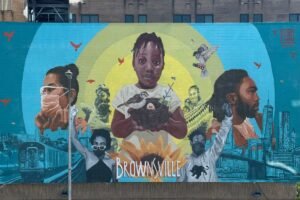
November 4, 2019; Shelterforce
Six New Jersey hospitals, in partnership with the New Jersey Housing and Mortgage Finance Agency (NJHMFA), are literally and figuratively breaking ground as they launch plans to provide affordable housing in New Jersey. While some hospitals around the country have been providing access to affordable housing in their service areas, NJHMFA’s model is the first of its kind in the country to offer financial incentives to participating hospitals throughout the state. Most of the hospitals are located in urban areas. St. Joseph’s University Medical Center in Paterson is leading the way; they’ve almost got formal approval from NJHMFA to build a 71-unit project to be completed by mid-2021.
NPQ has noted that social determinants of health may have more to do with factors like access to healthy food, environmental hazards, poverty, and living conditions than they do with doctor’s visits and insurance coverage. There is a web of socioeconomic factors that determine the health of individuals and families whose incomes are below the poverty line.
The American Hospital Association reports that housing instability, whether as a result of homelessness, poor living conditions, or substandard housing structures, is directly related to health. According to research, individuals and families affected by these challenges generally have less access to preventive care and are more susceptible to chronic conditions like diabetes and cardiovascular or pulmonary disease. These patients end up in the emergency room for their medical care.
Kaiser Health News lays out the legal and moral implications of discharging a patient to an unsafe place to go. That includes the homeless, the frail who live alone, or those who have unstable housing. Patients who would otherwise go home end up staying in the hospital for weeks or months, even though their acute condition has been resolved. The hospital’s cost can be astronomical. In addition, emergency departments have to hold a patient needing acute care until a bed is available.
Many hospitals who serve vulnerable populations lack the funds to solve the problem. NJHFMA stepped in with a plan to fill the financial gap. The initiative was originated by Charles Richman, who heads the NJHMFA and was formerly the commissioner of the New Jersey Department of Community Affairs. The concept emerged from a smaller-scale 2015 collaboration with the Camden Coalition of Healthcare Providers. The pilot program offered housing vouchers to the homeless and other frequent users of healthcare. Its outcomes? Cost reduction and patient care that stabilized the health of the participants.
“Those two things came together,” says Richman. “Housing is healthcare. And hospitals are anchor institutions.”
The statewide program came about as a result of a 2018 brainstorming meeting that he and his chief of staff, Katie Brennan, had organized.
“We said, we know hospitals are doing some amount of housing around the country, but we’re not seeing that here in New Jersey,” remembered Richman. “What can we do at NJHMFA to stimulate the market?”
The agency decided to provide subsidies and offer permanent mortgages to ensure the program’s success. Because the agency is in charge of distributing tax credits, it could help hospitals, too.
Sign up for our free newsletters
Subscribe to NPQ's newsletters to have our top stories delivered directly to your inbox.
By signing up, you agree to our privacy policy and terms of use, and to receive messages from NPQ and our partners.
Plans included offering $4 million to a hospital that was willing to build an affordable housing development and providing a mortgage and assisting with the project’s financing. The hospital’s responsibility would be to match that funding and provide land or a building for the project. The agency stipulated that housing be affordable to families earning less than 80 percent of people living below 50 percent of the AMI. Projects must include 10–15 units reserved for frequent users of the hospital’s services and must provide supportive services to them and other residents.
Soon into the program, it became apparent that NJHMFA needed to make adjustments. While some hospital systems are well-funded, small independent and community-focused hospitals would have a difficult time coming up with the match.
“Not all hospitals are the same,” says Richman. “So, an aspect of our program is that we’re willing to lend the hospital their contribution.” While the loan will be interest-bearing, it will be reasonable.
The New Jersey Hospital Association (NJHA) has turned its attention toward innovative ways to address systemic forces.
“We realized it’s not just what we do inside our four walls. Some of the frequent utilizers that come to the emergency room—if they don’t have stable housing, they can’t have stable health,” says Victoria Brogan, senior vice president of strategic initiatives. “So, this was a perfect fit.”
NJHA convened a meeting with NJ hospital CEOs to hear Richman’s pitch. He says, “Hospital CEOs absolutely recognized that they are an anchor institution and have a responsibility to give back…now that they have a partner in [NJHFMA] to share that responsibility, they’ve jumped at it.”
St. Joseph’s, the first to jump in, had already been considering developing the area around the hospital campus and had begun to acquire properties and get approval from local and state governments. What’s more, the hospital already had a vacant tract of land 300 yards from this hospital. It was well positioned to present a proposal to the NJHMFA in early 2019. Final agency approval is contingent upon St. Joseph’s getting a firmer sense of the financials and finalizing the plan, at which time it would be awarded a $3 million subsidy and a loan of $3 million representing the hospital’s share.
Patterson-based nonprofit New Jersey Community Development Corporation (NJCDC) and St. Josephs are joining forces to determine the type of units in the building, as well as ground floor space where services will be provided. To complement the hospital initiative, NJHMFA is allocating another $5 million to strengthen the neighborhoods surrounding the hospital.
Richman anticipates working with the N.J Department of Community Affairs to identify potential partners, to help NJHMFA communicate to neighborhood residents, and to determine need. He hopes that as local organizations build capacity, the funding will grow as well.
The initiative has gotten the attention of finance administrators around the country, recognizing the potential of creating a paradigm shift in the way that healthcare addresses social determinants that jeopardize the healthcare of vulnerable populations.—Meredith Betz











